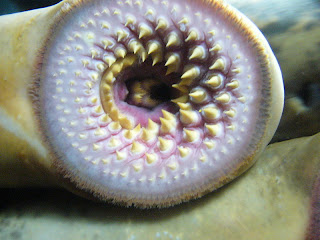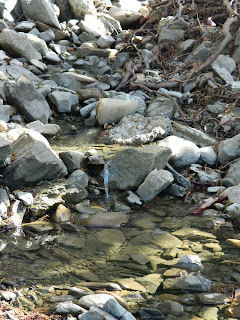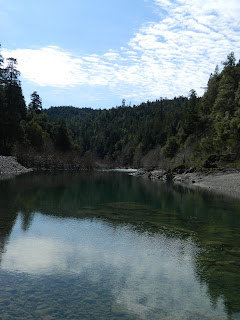Crossing the Eel River and then a few miles later
we cross it again and again and I begin to believe there is more than one Eel,
there are 14 of them. Here is why. The
river is 200 miles long and runs somewhat parallel to the coast. The river and its tributaries actually cover 3,448
miles.
In 1850 Josiah Gregg and a party of men were
exploring the area when they came upon a group of Native American people.
Josiah traded a pan to them for what he thought were eels from the river. They
were actually Pacific lamprey.
What is a lamprey you ask? It is a jaw-less fish-like vertebrate, with a toothed funnel like, sucking, mouth. Some species of lamprey
are known to bore holes into fish and suck on their blood.
The adult Pacific lamprey resembles an eel being
about 30 inches long, dark blue or brown in color. This species is born in
fresh water and swim to the ocean as juveniles returning to fresh water as
adults to reproduce. The Pacific lamprey
is parasitic to other fish. They will live as young juveniles in fresh water
rivers for 3 to 7 years before swimming out to sea where they will spend
another 1 or 2 years maturing into adults. The female will lay over 100,000 eggs once she
has survived her upstream swim and created a nest. After which she and the male will die.
Now, so you do not think the Native Americans
traded something horrible with Josiah and his party; Pacific lampreys are an important
ceremonial food of American Natives of the northern Pacific Coastal area.
We stopped at a natural swimming hole that is
created at a curve in the river by a small tributary.
The water is an amazing turquoise
green in color and flows at a sedate pace in this area.
There is a rock a few
feet from shore and a deep hole on the other side. Posted are No Diving signs. There was a small bit of white water just out
of sight but we could hear it further down river.
Not far from here we stopped in an emerald forest
of redwoods. The moss is what made the entire area look so magical and green.
Next week…. A drive through tree…..











No comments:
Post a Comment